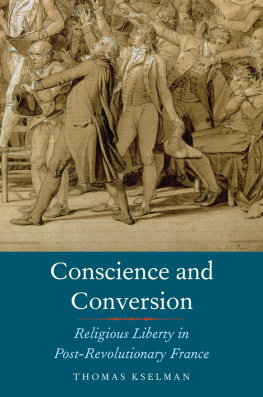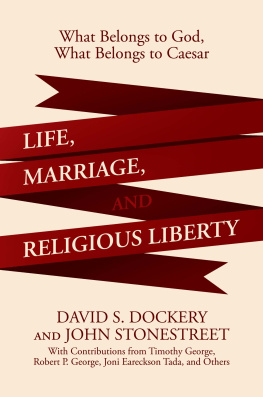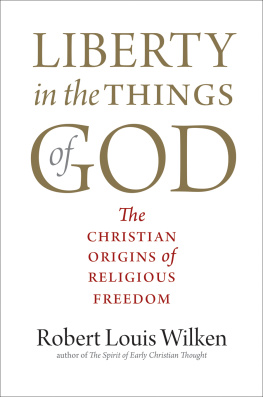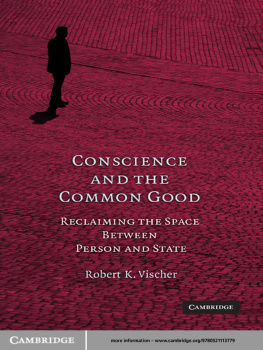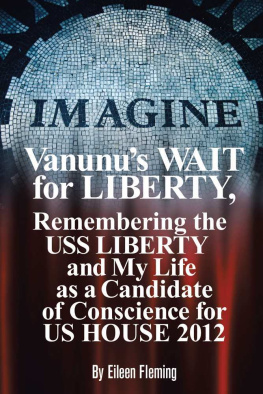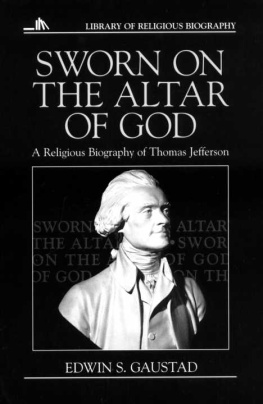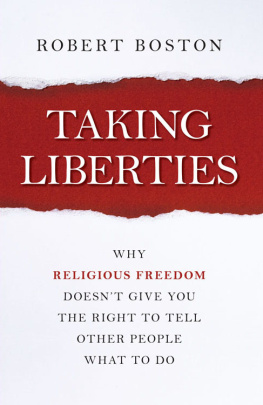Thomas Kselman - Conscience and Conversion: Religious Liberty in Post-Revolutionary France
Here you can read online Thomas Kselman - Conscience and Conversion: Religious Liberty in Post-Revolutionary France full text of the book (entire story) in english for free. Download pdf and epub, get meaning, cover and reviews about this ebook. year: 2018, publisher: YaleUP, genre: Religion. Description of the work, (preface) as well as reviews are available. Best literature library LitArk.com created for fans of good reading and offers a wide selection of genres:
Romance novel
Science fiction
Adventure
Detective
Science
History
Home and family
Prose
Art
Politics
Computer
Non-fiction
Religion
Business
Children
Humor
Choose a favorite category and find really read worthwhile books. Enjoy immersion in the world of imagination, feel the emotions of the characters or learn something new for yourself, make an fascinating discovery.
- Book:Conscience and Conversion: Religious Liberty in Post-Revolutionary France
- Author:
- Publisher:YaleUP
- Genre:
- Year:2018
- Rating:3 / 5
- Favourites:Add to favourites
- Your mark:
- 60
- 1
- 2
- 3
- 4
- 5
Conscience and Conversion: Religious Liberty in Post-Revolutionary France: summary, description and annotation
We offer to read an annotation, description, summary or preface (depends on what the author of the book "Conscience and Conversion: Religious Liberty in Post-Revolutionary France" wrote himself). If you haven't found the necessary information about the book — write in the comments, we will try to find it.
Thomas Kselman: author's other books
Who wrote Conscience and Conversion: Religious Liberty in Post-Revolutionary France? Find out the surname, the name of the author of the book and a list of all author's works by series.
Conscience and Conversion: Religious Liberty in Post-Revolutionary France — read online for free the complete book (whole text) full work
Below is the text of the book, divided by pages. System saving the place of the last page read, allows you to conveniently read the book "Conscience and Conversion: Religious Liberty in Post-Revolutionary France" online for free, without having to search again every time where you left off. Put a bookmark, and you can go to the page where you finished reading at any time.
Font size:
Interval:
Bookmark:
Conscience and Conversion

Copyright 2018 by Yale University.
All rights reserved.
This book may not be reproduced, in whole or in part, including illustrations, in any form (beyond that copying permitted by Sections 107 and 108 of the U.S. Copyright Law and except by reviewers for the public press), without written permission from the publishers.
Yale University Press books may be purchased in quantity for educational, business, or promotional use. For information, please e-mail (U.K. office).
Set in Fournier type by IDS Infotech Ltd., Chandigarh, India.
Printed in the United States of America.
Library of Congress Control Number: 2017947665
ISBN 978-0-300-22613-3 (hardcover : alk. paper)
A catalogue record for this book is available from the British Library.
This paper meets the requirements of ANSI/NISO Z39.48-1992 (Permanence of Paper).
10 9 8 7 6 5 4 3 2 1
For Claudia
Contents
Preface
When I began this book several years ago, I thought it would be about the history of Jewish-Christian relations in modern France. Some of the research based on this original idea shows up in , but in pursuing this topic I became fascinated with Jewish converts to Catholicism, as they struggled with themselves, their families, and their communities in the borderlands between two religions. The stories of these converts opened up a broader question, about how and why people make religious choices, and the contexts that both allow and constrain these decisions. As often happens with historical research, I did not plan the journey I ended up taking, as I moved from Jewish-Christian relations, to conversions, and eventually to religious liberty as my subject.
The freedom to choose a religious identity is for me a personal as well as a scholarly concern. Family bonds tie me to both Catholicism and Judaism, but I stand at the margins of both traditions, regarding them with a combination of affection, respect, and skepticism. Writing this book has allowed me to study a time and a place where the religious liberty available to me and others in the West emerged in ways that continue to resonate in the modern world. I hope that the story I tell here will add to our knowledge of French history, but also to our understanding of the complex ways in which religious liberty in the modern world challenges individuals, families, and communities to adopt tolerant and open-hearted approaches toward religious differences.
Many people have helped me along the way. I owe a special debt of gratitude to the colleagues who have participated in the modern European reading group of the Nanovic Institute for European Studies at Notre Dame. Over the past several years members of the group have read and commented on all of the chapters, providing insight from a variety of disciplines and, perhaps appeared in a different form in The Bautain Circle and Catholic-Jewish Relations in Modern France, Catholic Historical Review 92 (2006): 177196, and Turbulent Souls in Modern France: Jewish Conversion and the Terquem Affair, Historical Reflections/Rflexions Historiques 32 (2006): 83104.
A number of institutions provided crucial financial support for this project. In the earliest stages of the research the Lucius Littauer Foundation provided a grant that got me started on Jewish-Christian relations. The Nanovic Institute at Notre Dame, led by Jim McAdams and Anthony Monta, never turned down a request on my part for funds to support work in France during the summer months. The Department of History provided sabbatical leaves and travel funds on several occasions. A grant from Notre Dames Institute for Scholarship in the Liberal Arts covered the costs of the index. I am grateful to Phil Nord and Jan Goldstein, for supporting my application for a fellowship from the National Endowment for the Humanities, and to the Endowment, which provided a grant that allowed me to spend a year of research and writing in 20082009.
All of the staff I encountered at the archives where I worked were friendly, professional, and efficient, but I want to single out Father Robert Bonfils, S.J., the archivist at the Jesuit archives in Vanves, and his successor, Barbara Baudry, for helping me with the sources on Alphonse Ratisbonne and Ivan Gagarin. Cline Hirsch Poynard, the archivist for the Sisters of Notre-Dame de Sion, went out of her way to help me find conversion narratives from the members of the congregation and caught some mistakes in my chapter on the Ratisbonne brothers. Thanks are also due to Marie-Claude Sabouret, who directs the archive at the Muse de la Vie Romantique, for her help in identifying valuable sources, and for stimulating conversations about Ernest Renan. I have never met Louis Le Guillou, Jean Balcou, or Georges Lubin, but this book could not have been written without their monumental achievements, multivolume editions of the correspondence of Flicit Lamennais, Ernest Renan, and George Sand. Over the past few months I have enjoyed working with Heather Gold, my editor at Yale University Press, a model of friendly efficiency in finding readers and moving the manuscript along through the publication process.
On a personal level, my time in Paris has been enriched by the friendship and hospitality of Claude and Ann Langlois and of Florian Michel and Sverine Blenner-Michel. Over the last few years I have been subjected to some good-humored teasing from my family about this book, which seemed always just one more year away. Behind the jokes I always felt their love and support, so thanks to my children, Dan, Joseph, and Julie, and to their spouses, Clara, Cristeen, and Conor. Claudia Kselman has read Conscience and Conversion in all its versions and responded thoughtfully and patiently when our conversation turned to converts, religious identity, and religious liberty. This book is dedicated to Claudia, who has meant everything to me for over forty years.
Conscience and Conversion
Introduction
Although those of us who live in western democracies argue passionately about the meaning of religious liberty, it is a right we take for granted. Of course, some of the current debates in the United States express alarm about threats to religious liberty coming from state regulation or, conversely, the overreach of religious communities that seek to impose their views on the broader society. In Europe the growing numbers of Muslims have made religious liberty a controversial issue, particularly in France, where the policy of lacit, built on the restriction of religion to the private sphere, has led to laws restraining the display of religious identity in schools, on the street, and most recently, on beaches.
Debates about religious liberty often turn on the expression of religious beliefs in the public sphere, set against the limits that the state imposes to maintain public order. Do religious communities have the right to open churches for public worship, and to establish schools to educate their children within their religious traditions? Can symbols of religious identity be
Religious conversions have long drawn the interest of memoirists, novelists, and scholars fascinated by the personal dramas of turbulent souls, from Paul and Augustine through contemporary tales of religious exploration and choice, such as those of Stephen Dubner and Emmanuel Carrre. We will observe all of these kinds of changes in the converts who will take up most of this book, and often we will see a single individual embodying several of these experiences, moving first within and then departing from a particular religious tradition. I would add that the converts I study end up in a more ambiguous position than typologies such as Rambos might suggest, an unsurprising result for a historical approach concerned with individuals in a particular time and place.
Next pageFont size:
Interval:
Bookmark:
Similar books «Conscience and Conversion: Religious Liberty in Post-Revolutionary France»
Look at similar books to Conscience and Conversion: Religious Liberty in Post-Revolutionary France. We have selected literature similar in name and meaning in the hope of providing readers with more options to find new, interesting, not yet read works.
Discussion, reviews of the book Conscience and Conversion: Religious Liberty in Post-Revolutionary France and just readers' own opinions. Leave your comments, write what you think about the work, its meaning or the main characters. Specify what exactly you liked and what you didn't like, and why you think so.

